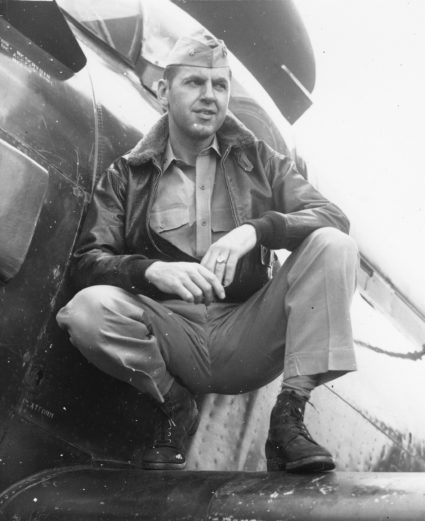
Authorities had issued an arrest warrant for Busfield over allegations of misconduct from when he was working as a director…

Navy Field
Limped out of the hot sky a hurt plane,
Held off, held off, whirring pretty pigeon,
Hit then and scuttled to a crooked stop.
The stranger pilot who emerged–this was the seashore,
War came suddenly here–talked to the still mechanics
Who nodded gravely. Flak had done it, he said,
From an enemy ship attacked.
They wheeled it with love
Into the dark hangar's mouth and tended it.
Coffee and cake for the pilot then who sat alone
In the restaurant, reading the numbered sheets
That tell about weather.
After, toward dusk,
Mended the stranger plane went back to the sky.
His curly-headed picture, and mother's and medal's
pictures
Were all we knew of him after he rose again,
Those few electric jewels against the moth and
whining sky.
Reprinted with permission from the William Meredith Foundation.
William Meredith was born in New York City on Jan. 9, 1919. He began writing poetry while attending Princeton University and then worked briefly as a reporter for The New York Times.
In 1942, he served as a carrier pilot for the U.S, Navy in the Pacific Theater during World War II. During his service, Meredith's first book of poems, "Love Letter from an Impossible Land" (Yale University Press, 1944), was chosen for the Yale Series of Younger Poets. After the war, he taught English at Princeton University but he returned to the Navy as a pilot in the Korean War, achieving the rank of lieutenant commander.
Following his retirement from the military, Meredith taught writing at Connecticut College for nearly three decades. He served as the poet laureate of the United States and published nearly a dozen collections, winning the Pulitzer Prize for "Partial Accounts: New and Selected Poems" (Alfred A. Knopf, 1987).
In 1983, Meredith suffered a stroke which severely restricted his ability to speak. His resulting collection, "Effort at Speech: New and Selected Poems" won the National Book Award. In the foreword to that book, poet Michael Collier wrote: "Trapped, as it were, inside his body, which has profoundly betrayed him, for the past decade and a half Meredith has remained occupied with the poet's struggle–the struggle to speak."
Meredith died on May 30, 2007, at the age of 88, survived by his partner, writer Richard Harteis.
Sustain our coverage of culture, arts and literature.